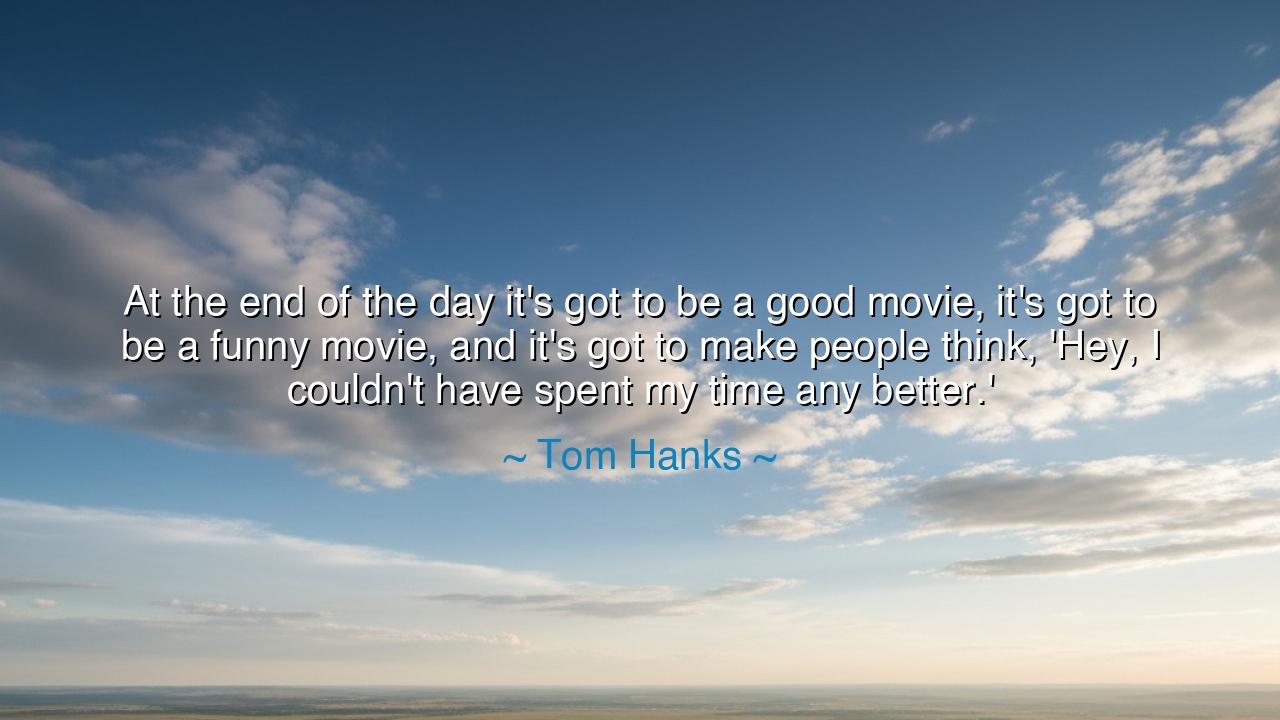
At the end of the day it's got to be a good movie, it's got to be
At the end of the day it's got to be a good movie, it's got to be a funny movie, and it's got to make people think, 'Hey, I couldn't have spent my time any better.'






“At the end of the day it’s got to be a good movie, it’s got to be a funny movie, and it’s got to make people think, ‘Hey, I couldn’t have spent my time any better.’” — Tom Hanks
In this statement, Tom Hanks, a craftsman of both heart and humor, speaks not merely about cinema, but about the essence of creation itself — the duty of the artist to shape something that both delights and enlightens the human soul. Beneath the modesty of his words lies a philosophy as old as art itself: that goodness, joy, and meaning are the three pillars upon which all enduring works must rest. To make a “good movie,” he says, is to create with excellence and integrity; to make it “funny” is to breathe life and warmth into it; and to make it worth someone’s time is to touch their mind and spirit, leaving them changed, if only a little.
The ancients would have recognized this wisdom, though they spoke of it in different tongues. In the amphitheaters of Greece, the playwright Aristophanes filled his comedies with laughter, yet each jest carried a lesson about the follies of men and the burdens of society. His plays were not merely amusing — they were mirrors for the soul, inviting reflection through mirth. Tom Hanks’s words are cut from the same stone: for what is a film, or any act of art, if it does not make us laugh, feel, and remember something truer than ourselves? Art that lasts must entertain the body, nourish the heart, and awaken the mind.
The phrase “at the end of the day” carries its own quiet weight. It is the wisdom of one who has lived long enough to know that time, not applause, is the final judge. When the lights dim and the audience rises to leave, what remains? Not the glamour, not the reviews, but the feeling that the hours were well spent — that the heart was stirred, the spirit uplifted, the mind refreshed. This is the artist’s sacred duty, not only in film but in every craft: to honor the time of those who come to watch, to listen, or to learn. For time is the one currency that cannot be repaid. To waste it is the greatest sin; to enrich it is the greatest gift.
There is a story that echoes this truth in another age — the tale of Leonardo da Vinci and his painting of The Last Supper. It is said that Leonardo labored for years on that wall, often spending hours in silent thought before a single brushstroke. When asked why he worked so slowly, he replied, “Because I seek not the praise of the moment, but the eternity of beauty.” His art was his offering to time itself. So too, when Tom Hanks speaks of making a film that makes people say, “I couldn’t have spent my time any better,” he speaks of the same reverence — of creating something worthy of the human experience.
The funny movie he mentions is not merely about laughter, but about connection. Humor is the bridge that spans all differences; it binds hearts together across generations and divides. The ancients believed that laughter was divine — a spark of light that reminds mortals that even amidst sorrow, joy can still be found. A good laugh, like a good story, renews the soul. Thus, to make something “funny” in the truest sense is not to mock or belittle, but to heal, to unite, to remind us that we are all stumbling through this world together — fragile, flawed, and still capable of joy.
And yet, it must also make people think. A story that leaves no echo in the mind fades quickly into dust. True art must awaken curiosity, compassion, or courage — it must plant a seed. The ancients taught that all creation is an act of service, and the highest form of service is to elevate others. When an artist, a teacher, or a leader gives something that makes others ponder their own lives, he participates in the oldest and most sacred of callings: the teaching of wisdom through experience.
So, my child, take this lesson from Tom Hanks and from those who came before him: whatever you create — whether it is a film, a poem, a gesture, or a day well lived — let it be good, let it carry laughter, and let it give meaning. When your work, your words, or your presence leaves others thinking, “I couldn’t have spent my time any better,” then you will have touched eternity. For the true measure of a life, like the true measure of a film, lies not in its length or fame, but in the light it leaves behind in the hearts of those who witnessed it.
And at the end of your own day, may you look upon the story you have written with your life and say, with quiet joy and gratitude: “It was good. It was funny. And it was worth the time.”






AAdministratorAdministrator
Welcome, honored guests. Please leave a comment, we will respond soon